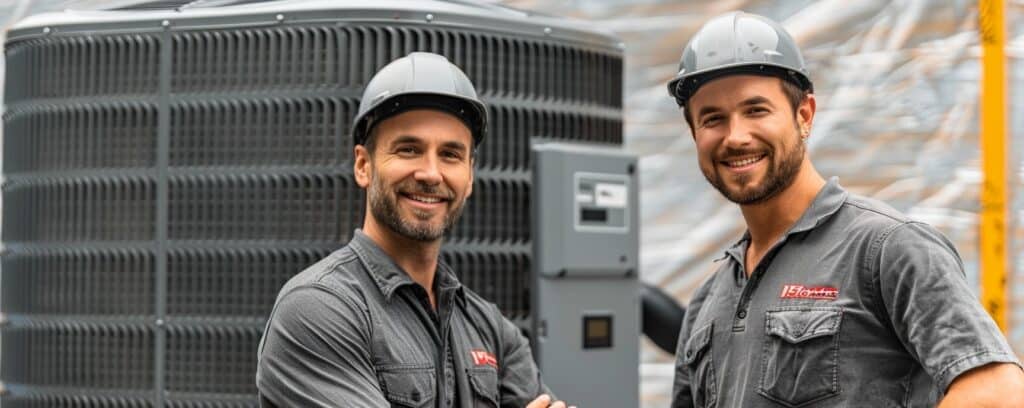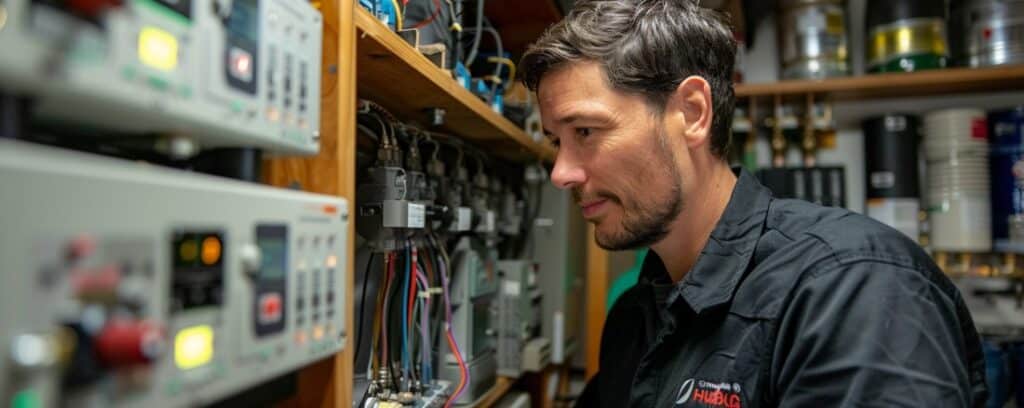The heating, ventilation, and air conditioning (HVAC) industry plays a key role in ensuring comfort and energy efficiency in buildings and homes worldwide. With the continuous push for advanced climate control solutions and sustainable living, the demand for skilled HVAC professionals is on the rise. This surge presents a wealth of opportunities for those considering an HVAC career or looking to further their HVAC career path.
Leveraging insights from reputable sources, including professional organizations and government agencies like the U.S. Bureau of Labor Statistics (BLS), this guide seeks to equip you with the knowledge needed to navigate the HVAC career path successfully.
Exploring HVAC Career Paths
The HVAC industry is vast and varied, offering numerous opportunities for those interested in technology, sustainability, and hands-on work. From residential services to commercial and industrial climate control, HVAC professionals play a crucial role in creating comfortable, efficient, and safe environments.
Here, we break down the main sectors within the industry and the typical career progression for HVAC professionals.
Understanding the HVAC Industry
HVAC systems are integral to modern life, controlling the climate in our homes, offices, schools, and factories. The industry encompasses several key sectors:
- Residential: Focusing on home heating, cooling, and air quality.
- Commercial: Serving businesses, healthcare facilities, and large buildings.
- Industrial: Specializing in complex systems for manufacturing plants and industrial settings.
- Institutional: Working within schools, government buildings, and similar establishments.
Each sector offers unique challenges and rewards, appealing to a wide range of interests and skills.
Career Path Overview
An HVAC career path can begin with entry-level positions such as an HVAC technician assistant, gradually advancing to technician, senior technician, and eventually lead to roles like HVAC engineer or project manager.
The journey is marked by continuous learning, certification achievements, and hands-on experience.
- Entry-Level Positions: Start as helpers or apprentices, gaining foundational skills.
- Mid-Level Roles: As technicians, professionals take on more responsibility, including installations, maintenance, and repairs.
- Advanced Career Opportunities: Senior roles may involve specialization, management, or moving into design and engineering aspects.
The potential for career advancement in the HVAC industry is significant, with many paths leading to rewarding and high-paying positions.
Understanding the variety of roles and how they contribute to the industry can help aspiring professionals carve out their niche and set career goals.
HVAC Job Types and Responsibilities
The HVAC industry offers a range of career options, each with its unique set of responsibilities. Here, we explore some of the key roles that contribute to the field’s success.
HVAC Technician
Responsibilities: HVAC technicians are the backbone of the industry, responsible for the installation, maintenance, and repair of heating, ventilation, air conditioning, and refrigeration systems.
Technicians diagnose and fix problems, ensuring systems operate efficiently and effectively.
HVAC Installer
Responsibilities: Specializing in the installation of new HVAC systems, installers work closely with blueprints and design specifications to ensure systems are installed correctly and meet all regulatory requirements.
Their role is critical in setting up efficient and effective heating and cooling systems in new constructions and during renovations.
HVAC Engineer
Responsibilities: HVAC engineers design new systems and equipment, focusing on energy efficiency and sustainability. They work on developing innovative solutions that meet the needs of modern buildings, considering factors like air quality and energy consumption.
Engineers may also oversee installation projects and perform system analyses.
Sales Representative and Project Managers
Responsibilities:
- Sales Representatives focus on selling HVAC equipment and systems to both residential and commercial clients. They must understand the technical aspects of HVAC products to advise customers on the best solutions for their needs.
- Project Managers oversee HVAC projects from conception to completion, ensuring they are completed on time, within budget, and to the client’s satisfaction. This role involves coordinating between the client, installation teams, and any other parties involved.
These roles highlight the diversity within the HVAC industry, offering career paths that cater to a range of interests and skills, from hands-on technical work to design and management.
Each position plays a vital role in delivering comfortable, safe, and efficient environments across various settings.
Salaries and Factors Influencing Earnings in HVAC Careers
A career in HVAC not only offers the potential for job stability and growth but also competitive compensation.
Here, we examine the salary ranges for HVAC professionals, focusing on “Heating, Air Conditioning, and Refrigeration Mechanics and Installers,” with insights from the U.S. Bureau of Labor Statistics (BLS) for May 2022.
National Salary Overview
The BLS reports that the national average annual wage for HVAC mechanics and installers is approximately $57,460, with a mean hourly wage of $27.63. Salary ranges vary based on experience, location, and specialization:
- The lowest 10% earn around $36,170 annually.
- The median 50% earn approximately $51,390.
- The top 10% can earn upwards of $82,630 annually.
Industry Employment and Wages
Employment levels and salaries can vary significantly across different industries within the HVAC sector. For instance:
- Building Equipment Contractors employ the majority of HVAC professionals, offering an annual mean wage of $56,330.
- Commercial and Industrial Machinery and Equipment Repair and Maintenance is another notable sector, paying an annual mean wage of $62,030.
Geographic Influence on Salaries
Location plays a crucial role in determining salary levels for HVAC professionals. States with the highest employment levels include:
- California: Offering an annual mean wage of $67,430.
- Florida: With a lower annual mean wage of $49,380, reflecting the state’s cost of living and demand for HVAC services.
Conversely, the top-paying states for HVAC professionals are:
- District of Columbia: The highest paying with an annual mean wage of $74,660.
- Alaska and Hawaiialso offer competitive salaries, exceeding $70,000 annually.
Factors Influencing HVAC Earnings
Several factors can influence an HVAC professional’s earnings, including but not limited to:
- Certifications and Specializations: Advanced certifications and specializing in areas like commercial refrigeration or green technologies can lead to higher wages.
- Experience: As with many trades, years of experience can significantly affect earnings.
- Geographical Location: Urban vs. rural settings and regional climates impact demand and wage levels.
Advancing in Your HVAC Career
Achieving success in the HVAC field involves more than just initial training. Advancement and higher earnings come through a combination of continued education, gaining experience, obtaining certifications, and specializing in high-demand areas.
Here’s how you can progress in your HVAC career path.
Certification and Training
Certification is not just a benchmark of skill and knowledge; it’s a tool for advancement. Many employers prefer or even require certifications, which can also lead to higher wages. Consider pursuing certifications from recognized bodies such as:
- North American Technician Excellence (NATE): NATE certification is among the industry’s most recognized and respected credentials for HVAC technicians.
- HVAC Excellence: Offers several certifications that validate professional competency in specific HVAC domains.
Regularly participating in training sessions and workshops can also keep you updated on the latest technology and practices in the industry.
Specialization Opportunities
Specializing in a specific area of HVAC can distinguish you from your peers and open the door to higher-paying opportunities. Some areas of specialization include:
- Green Technologies: Specializing in sustainable and energy-efficient HVAC systems can position you for jobs in the growing field of green building.
- Commercial Refrigeration: Technicians with skills in commercial refrigeration are in high demand, especially in the food service industry.
- Controls and Automation: As buildings become smarter, expertise in HVAC controls and automation systems can offer a lucrative career path.
Experience and Networking
Experience is invaluable in the HVAC industry. Working in various roles can provide a broad skill set and a deeper understanding of the field.
Networking with other professionals, attending industry events, and joining professional associations can also open doors to new opportunities and advancements.
Embracing New Technologies
Staying abreast of new technologies and trends in the HVAC industry, such as smart home technology or the shift towards more environmentally friendly refrigerants, can provide a competitive edge.
Being proficient in the latest technologies can make you more attractive to employers looking to offer cutting-edge solutions.
Job Outlook for HVAC Professionals
The HVAC industry is not only pivotal in maintaining comfort and safety in living and working environments but is also a field ripe with opportunity.
According to the U.S. Bureau of Labor Statistics (BLS), employment for heating, air conditioning, and refrigeration mechanics and installers is projected to grow by 6 percent from 2022 to 2032.
This rate of growth is faster than the average for all occupations, highlighting the robust demand for skilled HVAC professionals.
Projected Employment Growth
Over the next decade, an average of approximately 37,700 openings for heating, air conditioning, and refrigeration mechanics and installers are expected each year, according to the BLS .
A significant portion of these openings will arise from the need to replace workers who transition to different occupations or exit the labor force, including those retiring. This underscores the industry’s need for new entrants to fill roles and continue providing essential services.
Factors Driving Employment Growth
Several factors contribute to the promising job outlook in the HVAC industry:
- Construction Growth: The construction of commercial and residential buildings is anticipated to be a primary driver of employment growth for HVAC professionals. As new buildings go up, the need for installing new HVAC systems increases.
- Sophisticated Climate-Control Systems: The adoption of advanced climate-control systems is expected to further fuel the demand for qualified HVAC technicians capable of handling these complex installations and maintenance.
- Repair and Replacement Needs: A substantial portion of HVAC work involves the repair and replacement of existing systems. Efforts to enhance energy efficiency and reduce pollution are leading to retrofitting, upgrading, or complete replacement of older HVAC systems with more environmentally friendly and efficient models.
The Future of HVAC Careers
The HVAC industry is at the cusp of significant changes driven by technology, environmental concerns, and evolving consumer expectations. Understanding these trends is crucial for anyone looking to build a long-term career in this field.
Technological Advancements
Innovation in HVAC technology is rapidly transforming the industry. Smart home systems, IoT (Internet of Things) integration, and advances in energy-efficient designs are changing how HVAC systems are installed, monitored, and maintained.
Professionals with skills in these technologies will find themselves in high demand as the industry continues to evolve.
Emphasis on Sustainability
The growing concern over climate change and environmental sustainability is influencing HVAC practices. There’s an increasing demand for systems that use renewable energy sources, have lower emissions, and are more energy-efficient.
Professionals who specialize in green technologies and sustainable practices will be well-positioned for future opportunities.
Changing Regulations
Regulatory changes focusing on energy efficiency and environmental protection are likely to impact the HVAC industry. Staying informed about these changes and understanding how to comply with new standards will be essential for HVAC professionals.
Those who can navigate these regulations effectively will play a critical role in the industry’s future.
The Push for Indoor Air Quality
The global pandemic has heightened awareness of the importance of indoor air quality (IAQ). As a result, there’s a growing emphasis on HVAC systems that can improve IAQ through better filtration and ventilation.
Skills in designing, installing, and maintaining such systems will become increasingly valuable.
Workforce Development
With the projected growth in the HVAC industry, attracting and training the next generation of professionals is a priority.
Opportunities for apprenticeships, on-the-job training, and continuous professional development will expand, providing pathways for new entrants and career advancement for existing professionals.
Navigating Your HVAC Career Path
As we’ve explored the vast landscape of HVAC career opportunities, from the foundational roles of technicians and installers to the advanced positions of engineers and project managers, it’s clear that this industry offers a promising and rewarding career path. Understanding the different job types, salary expectations, and future trends is crucial for anyone looking to enter or advance within this field.
The HVAC industry is characterized by continuous innovation and growth, driven by the ever-increasing demand for energy efficiency and improved indoor air quality.
With the projected employment growth and the ongoing need for skilled professionals, now is an opportune time to consider or further your career in HVAC.
We encourage aspiring and current HVAC professionals alike to pursue further education and obtain certifications. Doing so will not only enhance your skills and knowledge but also position you for success in an evolving industry landscape.
The commitment to lifelong learning and adaptability is key to maximizing your career potential in HVAC.
Additional Resources
For those interested in exploring HVAC careers further, here are some reputable sources to get you started:
- North American Technician Excellence (NATE) : www.natex.org – Offers certification and testing for HVAC professionals.
- HVAC Excellence : www.hvacexcellence.org – Provides certification programs and educational resources.
- Air Conditioning Contractors of America (ACCA) : www.acca.org – Offers training programs and industry standards for HVAC contractors.
- U.S. Bureau of Labor Statistics – Occupational Outlook Handbook: Heating, Air Conditioning, and Refrigeration Mechanics and Installers – Provides detailed information on the HVAC profession, including salary data, job outlook, and educational requirements.
Embarking on an HVAC career path offers the chance to make a significant impact on environmental sustainability, comfort, and safety in our communities. With the right training, certifications, and a forward-looking approach, you can build a fulfilling career that meets the demands of tomorrow.




